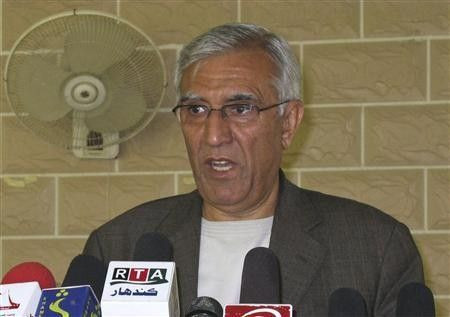Suicide blast kills mayor of Afghanistan's Kandahar city

A suicide bomber killed the mayor of Afghanistan's Kandahar Wednesday, a further blow to stability in the southern city still reeling from the assassination two weeks ago of President Hamid Karzai's powerbroker half-brother.
The death of Mayor Ghulam Haidar Hamidi, a U.S. citizen, is the latest in a string of assassinations of powerful southern leaders and Karzai allies that could weaken the president's hold on an area that has long been a Taliban stronghold.
Two of Hamidi's deputy mayors were killed in attacks by insurgents last year, and in the last four months the provincial police chief, top cleric and leading powerbroker -- Karzai's brother -- have all been assassinated.
While it is unclear if all these were the work of insurgents, they have stirred up uncertainty and fears of greater instability at a time when foreign troops are starting a hand over to Afghan forces.
Kandahar province is the Taliban's birthplace and a focus of recent efforts by a surge of U.S. troops to turn the tide against the insurgency in the decade-long war.
Hamidi, 65, was killed and one person was wounded when a suicide bomber detonated his explosives in a corridor near Hamidi's office, said Zalmay Ayoubi, spokesman for the provincial governor.
Kandahar police chief Abdul Razaq said Hamidi was meeting elders from a city district when one of them got close to the mayor and detonated a bomb hidden in his turban.
The mayor wanted to speak with the elders after they accused city staff of killing a woman and two children when they bulldozed some houses and shops Tuesday, Razaq said. The buildings were unplanned, he added.
Taliban spokesman Qari Yousuf Ahmadi initially said it was too early to tell what had happened but later claimed responsibility for killing Hamidi.
Ahmadi said the mayor had been on a Taliban hit-list and the main motivation for the attack was the deaths of the woman and children when the buildings were destroyed.
The Taliban are normally very quick to claim responsibility for the deaths of high-profile political figures.
NO RUSH TO JUDGEMENT
U.S. Ambassador to Afghanistan Ryan Crocker condemned the killing of Hamidi, but warned there should not be a rush to judgement over who carried out the attack.
"There was a demonstration in front of the mayor's office over a road-building incident that resulted in the deaths of one or two young girls. This could turn out to be a murder that didn't have anything to do with the Taliban," he said.
"It is another indication again of both the challenges Afghanistan faces, but also the extraordinary resilience of the Afghan government and people," he said.
The U.S. embassy in Kabul confirmed Hamidi was a U.S. citizen.
Karzai condemned the killing, saying in a statement Hamidi was "a real son of this country" who had done a lot for the people of Kandahar.
His death comes at a time when experts say a dangerous power vacuum has been created in Afghanistan's south by the assassination of Karzai's half-brother, Ahmad Wali Karzai.
More than half of all targeted killings in Afghanistan between April and June were also carried out in Kandahar, according to a U.N. report. The police chief of Kandahar province, Khan Mohammad Khan, was killed by an attacker wearing a police uniform in mid-April.
But the loss of Ahmad Wali Karzai, who though controversial was believed to balance and bully other key players into some kind of fragile unity, is widely expected to bring further short-term upheavals.
Karzai was head of the Kandahar Provincial Council, a largely consultative role, but his power came from his family and tribal connections, and his fortune. He was killed by a guard at his home in Kandahar city on July 12.
At his funeral service a couple of days later, a suicide attacker who also appeared to have concealed explosives inside his turban killed the most senior cleric in Kandahar.
A top Karzai adviser, Jan Mohammad Khan, a former governor of southern Uruzgan province who still wielded influence there and was close to the president, was killed in an insurgent attack on his home in Kabul on July 17.
Hamidi had been mayor of Kandahar since 2007 when he was appointed by President Karzai, a long-time friend.
He grew up in Kandahar province, studied at Kabul University and worked at the Ministry of Finance for 13 years, said the provincial media office. He moved to Pakistan and then the United States, where he lived for 20 years.
Hamidi was working as an accountant in a travel agency in Alexandria, Virginia, before moving back to Afghanistan to become Kandahar mayor. He had five daughters and two sons.
© Copyright Thomson Reuters 2024. All rights reserved.





















